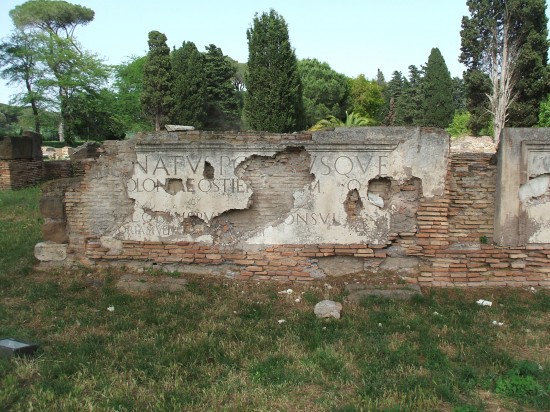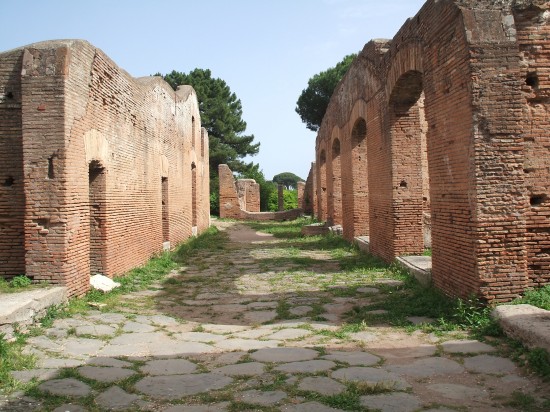
“Are you sure we’re in Rome?”
Matthew really had to wonder how his friend could possibly be looking at a sign like that and still have to ask the question. Sure, there were sections missing, but come on! There were roman numerals on it! They were using Vs instead of Us, for god’s sake! Knowing Jack for as long as he had, Matthew was not at all surprised, but still, you really had to wonder.
“Technically,” he began with a mild hint of annoyance, “we are not in Rome. This is Ostia Antica, as I explained to you several times on the train ride over.”
“Attempted to explain” might have been a more accurate description, as was evidenced by the fact that the fruitless task was repeated several times. To Jack, there was no form of transportation more romantic and exotic than the train. Matthew could sort of understand the fascination; living in the U.S., they had very little exposure to trains, while at the same time their constant appearance in popular culture as the setting for dramatic chases and robberies could not fail to excite the imagination. What he could not understand was his friend’s reaction every single time they boarded a train—even a perfectly boring local commuter train—which was to run around and jump up and down like a six-year-old that just ate an entire box of Pixy Stix.
“Ostia was the port of ancient Rome,” Matthew said, figuring that there might be some value in repeating himself for a fifth time now that Jack was off the train and relatively motionless. “Ostia means ‘mouth’ in Latin. The port was built here on the mouth of the Tiber River, where it emptied into the Tyrrhenian Sea.”
Jack looked around, and for once even Matthew was willing to admit that his puzzlement was justifiable. “So . . . where’s the sea?”
“If you were listening carefully, you would have noted that I said that Ostia was the port of ancient Rome. Since then the sea level has fallen, and the area around the old port silted up. We’re now about two miles away from the water.”
“So what’s here now?”
“Just an archeological dig site and museum.” There was no point in sugar coating it. Jack had admitted that it was wrong of him to take control of the expedition the previous morning, and he declared that it was Matthew’s turn to pick their destination. Matthew had no obligation to try to pretend that there was anything there likely to excite his friend. Knowing Jack, he would probably do just fine making up something on his own anyway.
Jack wandered around, glanced at the ruins of the ancient brick buildings, and then turned back to Matthew with a worried look on his face. “But are you sure that this is part of Rome?”
Matthew groaned. “Like I said, technically—”
“I’m not talking about that. It’s still part of the general Rome area, right?”
Matthew raised an eyebrow. He had rarely seen his friend so concerned. “What’s the matter?”
“There’s NO ONE here!” Jack shouted, his voice echoing off the centuries-old walls. “This is ROME . . . or close to it anyway. The greatest city in the world! How can there be no one here? I mean, I know it’s just a bunch of boring ruined buildings, but it was like that in the Forum, too, and that place was packed! What’s going on here?”
What Matthew most wanted to say was: “Just a bunch of boring ruined buildings? The Forum? The former center of the known world? Admittedly, the signage there is lacking, so for someone unfamiliar with its history it might be difficult to appreciate, but still! The FORUM? Boring? Let me tell you a thing or two about the Forum . . .”
What it would have been most honest for Matthew to say was: “I know. That’s the reason I picked this place. It’s not that I’m not interested in the history, because I am, but that’s not the reason I specifically chose to come here today. I’m looking for the figure in gray. I wanted somewhere with no one else around, no crowds to disappear into. I know the gray-clad figure will have followed me here, because there are so many ruined walls and other convenient places to hide. But he doesn’t know I’m looking for him. He won’t be prepared. All of a sudden I’ll jump around a wall and then BAM . . . um, something will happen. I’m not exactly sure what.”
What Matthew actually said was: “Just because a place isn’t packed doesn’t mean it’s boring. Some sites just take a little more effort to enjoy. Ostia Antica isn’t famous like the Colosseum or the Circus Maximus, but it’s just as rich in historical significance—in fact, I’d say it’s even more so. You have to imagine what it was like back in the old days. Think about what the buildings looked like when they were whole. Picture the streets when they were full of merchants pouring in from all around the Mediterranean Sea. Trust me, you won’t think it’s boring then.”
Jack was trying, Matthew had to give him that. He could see the effort on his friend’s face. Unfortunately, there were just some things that Jack’s imagination was really good at and some things at which it was terrible. So Matthew took pity on his friend and gave him something easier to work with. “It was sacked by pirates, too.”
“What?” Jack asked. Matthew could have sworn he saw his friend’s ears perk up. “Did you say pirates?”
Matthew nodded. “Now, there’s no record of any treasure being buried in this area, but . . .”
“Well why didn’t you say so in the first place?” Jack asked, his face breaking into a broad smile. “We’ve got to hurry up and find this treasure before someone else does! Come on, help me find a shovel!”
 1 Comment »
1 Comment »
